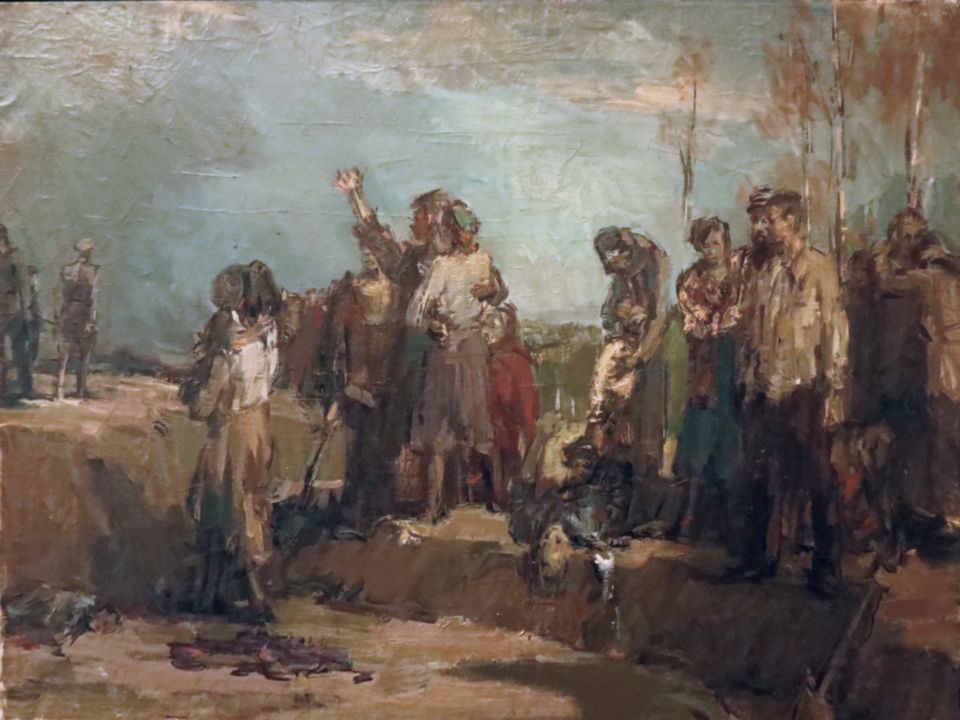[Editor’s Note: We are publishing this poem by Olga Anstei, which appears here for the first time in English translation, along with the original Russian. Dr. Maria Bloshteyn is translating Anstei’s work and has very generously agreed to let us share with our readers this moving record of a great evil].
Kirillovsky Yar
Translated by Maria Bloshteyn
I.
Raindrops fell on that windless day.
Thorny sloes prickled with acerbic youth.
A limping tree stump in the twilight,
knocked-over tombstones, chapels…
A slip of a girl, a dusky Dryad—
down the damp path into the nocturnal ravine!
There, in the wild garden’s balmy thicket,
unloved but faithful, he’ll fall at my feet!..
Into the depths, down the slopes—until stars come out!
The most carefree of all carefree places!
II.
Closer to noon. It was sunny and bright.
Youthful acerbity flows out gently,
growing more mellow, growing more joyful.
On the hot chalky bluffs the swift
turns his clever head.
Wormwood wilts, held between palms.
Thyme trembles on an angled ledge.
The bumblebee is a beloved tiny brother!
Blue warmth flows down into the Yar…
Handful by handful from all around
into the most fragrant of all fragrant places.
III.
Onward. Obedient to some obscure call,
I go to the crossroad between older graves,
out of a hushed beloved house,
where Azrael stands at the threshold.
I carry a cross that still wants tears,
that raises three mortal candles
that is covered with wax drips
that saw a shroud and head-wreath in the night…
It will be dug into place there, a loathed gift,
at the head of a nameless grave…
The most frightening of all frightening places!
A frightening brown contorted cross!
IV
The last cup of all. The same place where
nature once drowsily luxuriated,
became Golgotha, the base of the cross
to a strange and fateful people.
Listen! They were lined up,
their belongings piled on the gravestones…
Half-smothered, half-killed,
then half-covered with soil…
Do you see those old women in kerchiefs,
elders, dignified like Biblical Abraham,
and curly-headed babes, like those in Bethlehem,
in their mothers’ arms?
I can’t find words for this.
Look: here on the road lie dishes,
a torn tallit, scraps of Talmud,
shreds of passports washed out by rain!
A black—murderous—blood-encrusted cross!
The most horrific of all horrific places.
(December 1941)
Кирилловские яры
I
Были дождинки в безветренный день.
Юностью терпкой колол терновник.
Сумерки и ковыляющий пень,
Сбитые памятники, часовни…
Влажной тропинкой — в вечерний лог!
Тоненькой девочкой, смуглой дриадой —
В тёплые заросли дикого сада,
Где нелюбимый и верный — у ног!..
В глушь, по откосам — до первых звёзд!
В привольное — из привольных мест!
II
Ближе к полудню. Он ясен был.
Юная терпкость в мерном разливе
Стала плавнее, стала счастливей.
Умной головкою стриж водил
На меловом горячем обрыве.
Вянула между ладоней полынь.
Чебрик дрожал на уступе горбатом.
Шмель был желанным крохотным братом!
Синяя в яр наплывала теплынь…
Пригоршнями стекала окрест
В душистое из душистых мест.
III
Дальше. Покорствуя зову глухому,
На перекрёсток меж давних могил
Прочь из притихшего милого дома,
Где у порога стоит Азраил —
Крест уношу, — слезами не сытый,
Смертные три возносивший свечи,
Заупокойным воском облитый,
Саван и венчик видавший в ночи…
Будет он врыт, подарок постылый,
Там, в головах безымянной могилы…
Страшное место из страшных мест!
Страшный коричневый скорченный крест!
IV
Чаша последняя. Те же места,
Где ликовала дремотно природа —
Странному и роковому народу
Стали Голгофой, подножьем креста.
Слушайте! Их поставили в строй,
В кучках пожитки сложили на плитах,
Полузадохшихся, полудобитых
Полузаваливали землёй…
Видите этих старух в платках,
Старцев, как Авраам, величавых,
И вифлеемских младенцев курчавых
У матерей на руках?
Я не найду для этого слов:
Видите — вот на дороге посуда,
Продранный талес, обрывки Талмуда,
Клочья размытых дождём паспортов!
Чёрный — лобный — запёкшийся крест!
Страшное место из страшных мест!
(декабрь 1941)
Maria Bloshteyn, PhD, researches Russia and the United States. She is the author of The Making of a Counter-Culture Icon: Henry Miller’s Dostoevsky. She is also a literary translator and has published Alexander Galich’s Dress Rehearsal: A Story in Four Acts and Five Chapters, and Anton Chekhov’s The Prank. Her translations have appeared in a number of journals and anthologies, including The Penguin Book of Russian Poetry.
